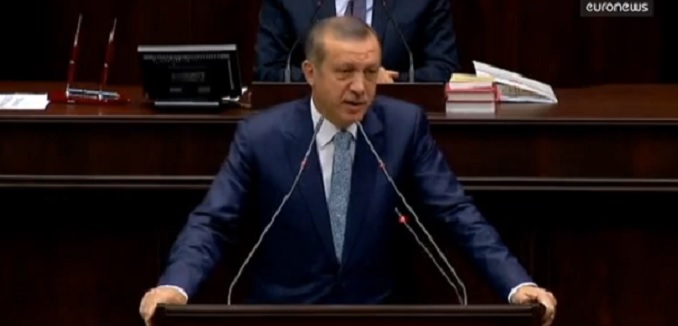Ongoing political warfare in Turkey – which has pitted the country’s ruling Justice and Development Party (AKP) against rival Islamists linked to U.S.-based cleric Fethullah Gulen – has generated renewed calls for the resignation of Prime Minister Recep Tayyip Erdogan, after the publication of audio recordings that seemed to document Erodgan and his son Bilal discussing how to hide immense sums of money.
After the alleged leak, Turkey’s main opposition Republican People’s Party (CHP) held an emergency meeting where they discussed the voice recording. The CHP said the government has lost its legitimacy and called on Erdoğan to step down.
The executive board of the Nationalist Movement Party (MHP) also held a meeting under the leadership of chairman Devlet Bahçeli. Bahçeli said “the talks between the Prime Minister and his fugitive son is beyond our capacity of understanding.”
The conversations were allegedly held the eve of a corruption scandal that would eventually engulf several AKP elites, and Bilal himself was at one point brought in for questioning in relation to the sweeping graft probe. AKP leaders for their part have purged thousands of judges, prosecutors, and police figures, and – as evidence of corruption piled up – have sought to scapegoat Jews and foreign lobbies. The latest iteration of the scandal saw the release of five recordings – seemingly wiretapped phone conversations – in which Erdogan and his son discussed how to shield vast amounts of cash from police scrutiny. Erdogan on Tuesday forcefully denounced the recordings as forgeries, and meanwhile reportedly blamed the “robot lobby” for seeking to undermine AKP rule via Twitter.
During his address to his party’s parliamentary group on Feb. 25, Erdoğan claimed that a series of lobbies had allied to damage the ruling Justice and Development Party (AKP) and frustrate Turkey’s progress. “The robot lobby that they set up on social media hits with tweets. They tell them to increase the number of tweets,” he said.
The Turkish leader has repeatedly lashed out against the microblogging platform.
[Photo: euronews (in English) / YouTube]




